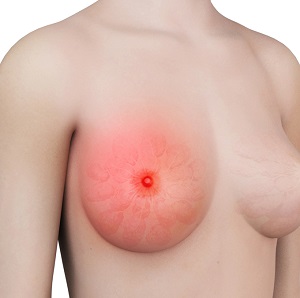
What is Inflammatory Breast Cancer?
Inflammatory breast cancer is a rare form of breast cancer in which the breast has a red and swollen appearance due to blockage of lymph vessels. This is an aggressive type of breast cancer that usually develops from the cells lining the milk ducts.
Who is at Risk of Developing Inflammatory Breast Cancer?
Compared to other types of breast cancer, inflammatory breast cancer occurs more often in younger women. African American women and obese women have an increased risk. This disease can also affect men.
What are the Symptoms Associated with Inflammatory Breast Cancer?
The symptoms of inflammatory breast cancer include:
- Swelling or redness involving at least one-third of the breast
- Increase in size of the breast, heaviness and tenderness and inverted nipple
- Tumour cannot usually be felt
- An orange peel appearance on the skin of the breast due to the collection of lymph fluid
- Swollen lymph nodes under the arm or near the collar bone
Inflammatory breast cancer progresses rapidly over a few weeks or months and can spread to the surrounding lymph nodes and other tissues. It may be diagnosed late in its course.
How is Inflammatory Breast Cancer Diagnosed?
Your doctor will review your symptoms and medical history, perform a physical examination and order certain tests.
Imaging tests performed include:
- Diagnostic mammogram
- Ultrasound of breast and nearby lymph nodes
- CT scan, PET scan or bone scan to check if cancer has spread
A biopsy may also be ordered.
Inflammatory Breast Cancer may be diagnosed late for several reasons:
- Symptoms are common to other conditions such as infection, injury or other type of breast cancer,
- Usually, no lump is felt on examination.
- The breast has increased density, so a screening mammogram may not be clear.
- The disease can occur and rapidly progress in between scheduled breast screenings.
Inflammatory breast cancer is considered if you have:
- Rapid onset of symptoms
- Redness involving at least a third of the breast
- No palpable mass
- Biopsy results that show invasive carcinoma
Staging of the cancer is performed to help your doctor decide on the treatment and prognosis of your condition. The cancer cells are checked for hormone receptors and increased levels of HER2 genes or proteins. This helps characterize cancer and can indicate possible treatment strategies. HER2-positive cancers are more aggressive.
How is Inflammatory Breast Cancer Treated?
Inflammatory breast cancer is treated by a multimodal approach which includes the following:
- Systemic chemotherapy is administered to shrink the tumour. Six cycles of chemotherapy are given over a period of 4-6 months.
- Surgery is performed to remove the cancerous tissue. This involves modified radical mastectomy i.e. removal of the affected breast and nearby lymph nodes in the breast and arm. Surgery is performed after chemotherapy but may be performed earlier if the cancer is progressing too rapidly. The chest muscles underlying the breast are usually preserved, but their lining layer is removed. In case of extensive disease, some chest muscles are also removed.
- Radiation therapy is used to destroy any remaining cancer cells after the breast is removed.
This multimodal approach has shown good results for treating inflammatory breast cancer.
What are the other options to treat inflammatory breast cancer?
Your doctor may also recommend one of the following treatments:
- Targeted therapy: For cancers with increased levels of HER2 protein, targeted therapy prevents the production of this protein and may be recommended before or after surgery.
- Hormone therapy: This treatment may be used for cancer cells with hormone receptors. Hormones such as estrogen bind to the receptors and help these cancers grow and multiply. Hormone therapy prevents the binding of the hormones to the receptors or prevents the production of the hormones. However, most cases of inflammatory breast cancer are hormone receptor negative.
- Breast reconstruction: Breast reconstruction is recommended to restore the breast shape.
What is the Prognosis of Inflammatory Breast Cancer?
Prognosis depends on factors such as:
- Type and location of the cancer
- Staging
- Age and general health
- Responsiveness to treatment
Though inflammatory breast cancer is an aggressive disease, it can be effectively treated if diagnosed early.
